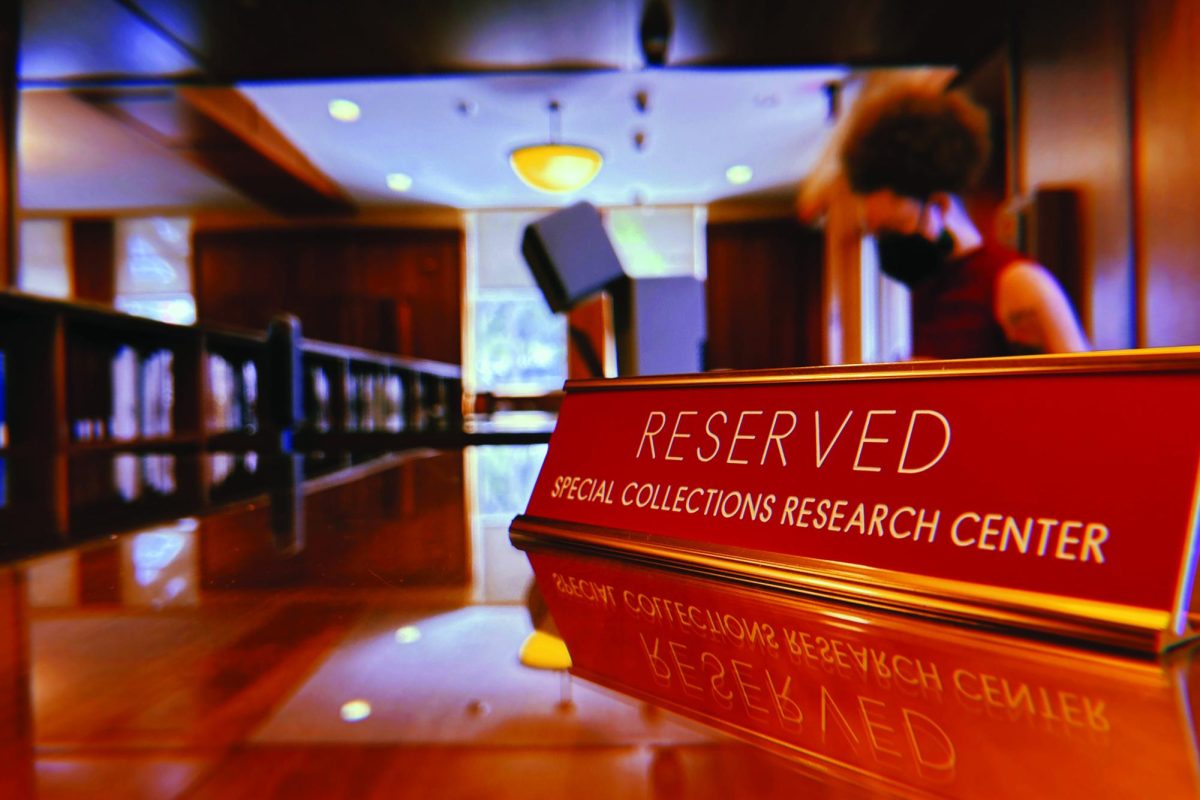Twenty-five students attended a candlelight vigil held in honor of Holocaust Remembrance Day Tuesday on Harris Field. The vigil was sponsored by Hillel, a Jewish organization on campus.
The vigil featured four speakers — one each from the Christian faith, the Muslim faith and the Jewish faith and one speaking about the current genocide situation in Darfur.
Ben Mazur, sophomore in statistics and treasurer of Hillel, said it was the first time the vigil took place and he hopes to make it an annual event. He said the vigil was successful despite the low turnout.
“I wasn’t disappointed. I was hopeful for more people, but I am happy with what we got,” Mazur said. “That’s 25 people walking away with new insights.”
Michael Burbeck, senior in economics, told the story of Saint Maximillian Colby, a priest who was arrested and sent to Auschwitz. While at the concentration camp, several prisoners escaped and 10 people were chosen at random to die because of the escape.
Colby stepped forward and took one man’s place. He and the nine other prisoners spent two weeks in a starvation chamber, then were killed by lethal injection.
Burbeck said the Holocaust affected everyone and showed the extremes of humanity, and people cannot stand by as evil occurs.
“We will not stand quietly and watch the world go by,” he said.
Yasmin Sadiq, senior in business marketing and communication, as well as Vice President of the Muslim Student Association, said people need to break down barriers of the past in order to help the future.
“The world today is chained in the shackles of corruption, violence and oppression,” Sadiq said. “We are all human with no matter to race or ethnicity or religion.”
She said people must find the light within themselves and strengthen their hearts to find the truth and make the world a better place.
“We must learn to work together… to take on the role as the generation that will change the world,” she said.
Mazur spoke about the lessons the Holocaust has taught the world and encouraged participants to find out what they can do to end genocide in the world.
“Never again — this is what the world was told, and more than that, this is what the world was promised after the Holocaust,” he said.
He cited several countries that have had genocide in the past 60 years: Bangladesh, Sudan and Rwanda, among others.
“What has happened to the past we promised not to forget?” Mazur asked.
Mazur went on to say that prejudices exist everywhere in the world, even on campus.
“Every single day, there are people on our own campus who feel hatred and persecution against them because of who they are or where they come from,” he said. “Too often do students feel alienated and left out because of stereotypes, incorrect judgment and false generalizations.”
Segen Fishastion, freshman in biology, said she is very active in the Darfur situation and thinks people need to be educated in order to work together as a unit to end the crisis.
“We have to remember our past — we need to tell others what’s going on,” she said, emphasizing the speakers’ encouragements. “The things people had to say really went through to the people who came.”
1.5 million childrenDimes for Darfur, an organization dedicated to educating the world about an ongoing humanitarian crisis, teamed up with Hillel to get the message across about the situation.
Colleen Bowker, sophomore in environmental engineering who is also part of the Dimes for Darfur campaign, said the government militias — called the Janjaweed — in Darfur have caused at least 400,000 black Africans to die and over 2.5 million people to be displaced from their homes.
“Four-hundred thousand. This is the total of the population of Raleigh,” Bowker said. She also said that 500 people, the number of students living in Wood Hall, die everyday in Darfur.
Bowker said open warfare broke out in Darfur in Feb. 2003 when two rebel groups attacked military installations, and the Janjaweed have since received government support to “clear” people from areas considered disloyal.
In 2004, she said, the United States called the actions genocide, but has put little to no pressure on the government to end the violence.
Bowker said now, the number of people who are dying from hunger and disease exceeds the number of people killed.
“Because of the region’s remoteness, hundreds and thousands at a time are being cut off and it’s becoming increasingly dangerous for humanitarians to provide aid,” she said.
Bowker encourages students to get involved with the campaign and to urge the government to take action to end the violence and genocide.
15,000 names
“Sara Paviotzki. Age 12. Died in 1942. Joszef Grunberger. Age 5. Died in 1944. Mike Klein. Age 8. Died in 1944.”
Hillel also set up a table in the Brickyard from 7:30 a.m. to 7:30 p.m. to read names of victims of concentration camps during the Holocaust. More than 20 students read names throughout the 12-hour period, attracting about 80 people, Mazur said.
“Hatred of others is still a big problem in the world, whether people see it or not,” he said. “Even right here on campus, it’s a problem we need to pay attention to. If we can’t get along just here on campus, then how can we expect there to be peace in the world?”
Students were presented with six different colored pieces of felt, each one representing a different group persecuted against during the Holocaust. Mazur said Hillel encouraged students to wear the fabrics because it was what the groups had to wear during the Holocaust and to honor the memory of those killed.
Mazur said that every action has an impact on the future.
“Speak up when you can, help others at every opportunity and maybe years down the road, we can look at the world in which we live and be proud to say that we helped to make it a better place; not only for ourselves, but for all of mankind and for the generations to come,” he said.



